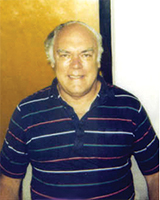
The Allen School family mourns the passing of professor emeritus Ted Kehl, one of the original group of seven faculty members who founded the Department of Computer Science at the University of Washington in the 1960s, and someone who was instrumental in introducing Seattle to a hardware revolution in the form of very large-scale integrated (VLSI) circuit design — a development that transformed computing and modern society.
Kehl earned his Ph.D. at University of Wisconsin-Madison in 1961 and joined the UW faculty six years later. As a professor in both Computer Science & Engineering and the School of Medicine, Kehl was known for his interdisciplinary approach to research long before it became fashionable. In addition to teaching physiology, biophysics and computer science, Kehl ran a hardware lab focused on the development of efficient computer hardware for biomedical research.
He took a keen interest in VLSI research and worked with Carver Mead of CalTech — who co-wrote the book on VLSI design along with Lynn Conway — to bring a new VLSI course to Seattle, jointly sponsored by UW and Boeing. That effort led to the establishment of the University of Washington/Northwest VLSI Consortium, a major initiative funded by the Department of Defense’s Advanced Research Projects Agency (ARPA) and led by Kehl in partnership with five regional companies. The course helped spawn the MicroVAX-I processor, which was developed by Digital Equipment Corporation under the leadership of Dave Cutler, then-head of the DECwest Engineering team. Kehl subsequently launched an undergraduate seminar in VLSI design in which teams of students had the opportunity to work with professional mentors drawn from the semiconductor industry on their designs.
In 1983, Kehl co-founded a startup company called IC Designs with his former Ph.D. student John Torode. IC Designs started out providing software and fabrication services for application-specific integrated circuits (ASICs) before its focus evolved into the design of ASICs for use in personal computers. The company grew to over $30 million in annual sales before its acquisition by industry leader Cypress Semiconductor Corp. in 1993.
Kehl retired from UW in 1997.
Our thoughts are with Ted’s family, friends, and the many students and collaborators whose lives he touched during his long and influential career.

